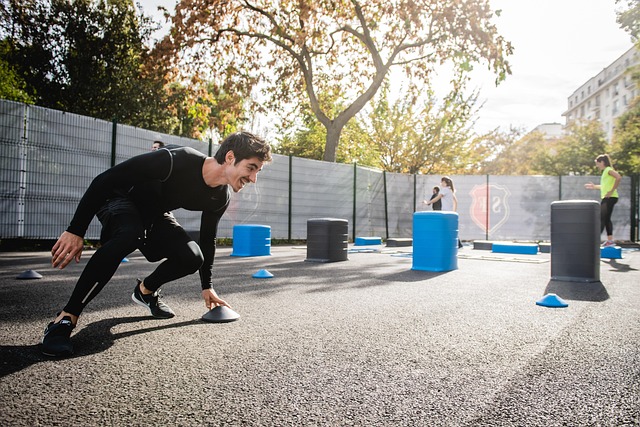Regenerative wellness support is a holistic approach that harnesses the body's natural healing powers through mindfulness, nutrition, exercise, and stress management. Nutrition, focusing on whole foods rich in antioxidants, omega-3s, probiotics, and prebiotics, forms a cornerstone for cellular repair and renewal. Regular movement, combining aerobic and strength exercises, boosts blood flow, delivers nutrients, and removes waste products. Mindfulness practices like meditation and deep breathing cultivate calmness and resilience, while stress management techniques create an environment conducive to healing. Integrating these principles into daily routines promotes balance, harmony, and overall vitality for a nurturing, sustainable lifestyle.
“Achieve life goals with regenerative health practices—a holistic approach to well-being that empowers your body’s natural healing power. In this comprehensive guide, we explore key components of regenerative wellness support, including nutrition, movement, mindfulness, and daily integration strategies. Unlock your full potential by understanding how these practices can transform your health and propel you towards your life goals.”
- Understanding Regenerative Wellness: Unlocking Your Body's Natural Healing Power
- The Role of Nutrition in Regenerative Health Practices
- Movement and Exercise for Optimal Regeneration
- Mindfulness and Stress Management as Foundation for Regenerative Wellness
- Integrating Regenerative Wellness into Daily Life: Strategies for Long-Term Success
Understanding Regenerative Wellness: Unlocking Your Body's Natural Healing Power

Regenerative wellness is a holistic approach that focuses on unlocking your body’s innate ability to heal and rejuvenate itself. It goes beyond traditional healthcare by addressing the root causes of imbalances, fostering an environment conducive to optimal health and vitality. By adopting regenerative practices such as mindfulness, nutrition, exercise, and stress management, you can harness your body’s natural healing power.
This proactive mindset is crucial in achieving life goals, as it empowers individuals to take control of their well-being. With the right combination of self-care routines and lifestyle adjustments, regenerative wellness support can transform your health, energy levels, and overall quality of life. It’s about nurturing your body, mind, and spirit to achieve a state of profound balance and harmony.
The Role of Nutrition in Regenerative Health Practices

Nutrition plays a pivotal role in regenerative health practices, serving as the foundation for supporting and enhancing overall well-being. A balanced and nutrient-rich diet is essential for fostering regeneration at a cellular level. By focusing on whole, unprocessed foods like lean proteins, complex carbohydrates, healthy fats, and an abundance of fruits and vegetables, individuals can provide their bodies with the building blocks necessary for repair and renewal. These macronutrients and micronutrients work synergistically to support various bodily functions, from immune system health to tissue repair, all crucial aspects of regenerative wellness.
Incorporating specific nutrients known for their regenerative properties further strengthens this approach. For instance, antioxidants help combat oxidative stress, while omega-3 fatty acids promote inflammatory balance. Probiotics and prebiotics foster a healthy gut microbiome, contributing to overall systemic health. Tailoring one’s diet to include these regenerative foods is a powerful step towards achieving life goals, as it optimizes energy levels, improves mental clarity, and promotes a sense of vitality—all key components in navigating the journey towards holistic wellness.
Movement and Exercise for Optimal Regeneration

Regular movement and exercise are pivotal components in supporting regenerative wellness. Physical activity stimulates blood flow, which carries essential nutrients and oxygen to cells, fostering optimal regeneration. It also helps flush out metabolic waste products that can hinder cellular repair processes. Incorporating a mix of aerobic exercises, like walking or cycling, and strength training, such as weightlifting or bodyweight exercises, ensures a well-rounded approach to movement.
Beyond the physical benefits, exercise has been shown to boost mental clarity and emotional well-being, contributing to a holistic sense of regeneration. It promotes the release of endorphins, often referred to as ‘feel-good’ hormones, which can reduce stress and enhance overall mood. Thus, a consistent exercise routine becomes a powerful tool in achieving life goals by supporting not just physical health but mental and emotional resilience as well.
Mindfulness and Stress Management as Foundation for Regenerative Wellness

Mindfulness and stress management are foundational practices for cultivating regenerative wellness. In today’s fast-paced world, stress has become an all too common companion, negatively impacting our overall health and well-being. Taking a step back and focusing on the present moment through mindfulness allows us to recognize and release the tension that builds up within our bodies and minds. By incorporating techniques such as meditation, deep breathing exercises, and yoga into our daily routines, we can create a sense of calm and resilience, which is essential for supporting regenerative wellness.
Stress management goes hand in hand with cultivating mindfulness. When stress levels are high, our bodies enter a state of fight or flight, hindering the body’s natural healing processes. Effective stress management involves identifying sources of stress and implementing strategies to mitigate their impact. This could include setting boundaries, prioritizing self-care activities, engaging in physical exercise, or connecting with loved ones. By managing stress effectively, we create an environment conducive to regeneration, allowing our bodies to repair and rejuvenate at a deeper level.
Integrating Regenerative Wellness into Daily Life: Strategies for Long-Term Success

Integrating regenerative wellness into your daily routine is a powerful step towards achieving life goals. It’s not just about adopting trendy practices; it’s about cultivating a mindset and lifestyle that nurture your body, mind, and spirit. Start with small, achievable changes like incorporating regular movement—whether it’s a brisk walk, yoga session, or dance class—as these activities stimulate healing and rejuvenation. Similarly, prioritizing quality sleep and stress-reducing techniques such as meditation or mindfulness exercises can significantly enhance your regenerative wellness.
For long-term success, consider making sustainable food choices by focusing on whole foods rich in nutrients that support tissue repair and inflammation reduction. Additionally, fostering meaningful connections through social engagement and community building can provide emotional resilience, a vital component of overall wellness. Remember, regenerative wellness is a journey; it requires patience, consistency, and self-compassion. By implementing these strategies into your everyday life, you’ll create a solid foundation for reaching your goals and thriving at every stage.
Regenerative wellness is not just a trend, but a holistic approach to achieving and maintaining life goals. By understanding and harnessing your body’s natural healing power through optimal nutrition, targeted movement, mindfulness, and stress management, you can create a foundation for long-term health and success. Integrating these practices into daily life supports regenerative wellness, enabling you to thrive and reach your full potential. Embrace these strategies for a more vibrant, balanced, and fulfilling future.
